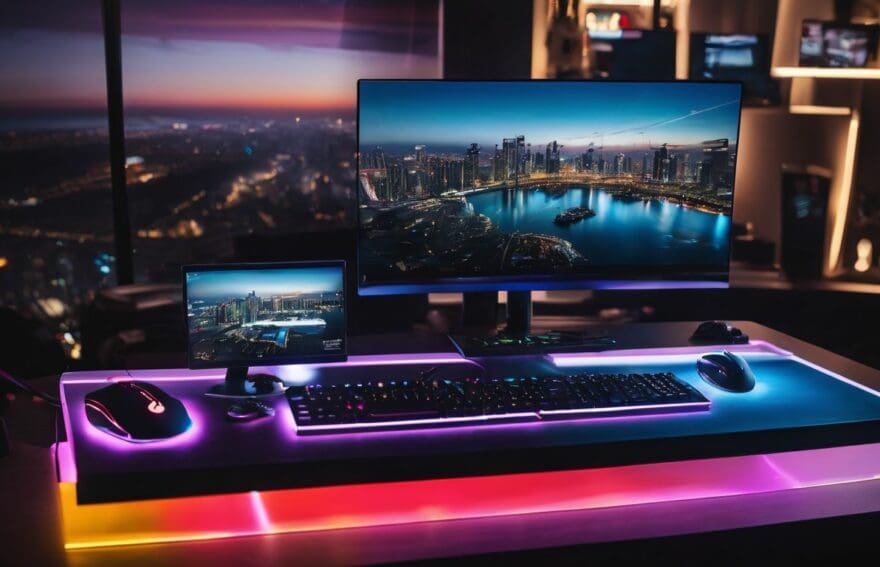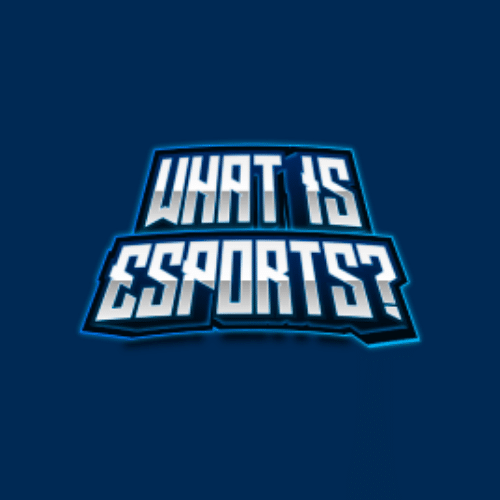Deep Learning: Customizing Esports Training Regimens

Updated On: February 14, 2024 by 
Struggling to level up in the relentless world of esports? Fear not; you’re in good company. Many have faced similar battles, and it’s precisely why we’ve delved into the advanced realms of deep learning to uncover innovative solutions.
In this blog post, we’ll gently unravel how personalising your training with AI isn’t just smart – it’s a strategic move that could turn those arduous gaming marathons into your very own triumphal arch.
Keep reading – you might just find this is exactly what tips the scales in your favour!
Key Takeaways
- Deep learning and AI technology significantly enhance esports training by providing personalised programmes that focus on a player’s unique strengths and weaknesses.
- Innovative technologies like VR training, biometric monitoring, and AI coaching offer immersive, realistic gaming experiences that improve players’ skills, decision-making, and performance under pressure.
- As esports continues to grow in popularity, there is an increasing demand for advanced training facilities equipped with high-speed internet connectivity, ergonomic setups and cutting-edge hardware to support deep learning applications.
- Esports professionals can pursue career advancements through improved nutrition strategies and physical fitness regimens tailored to optimise cognitive function and gameplay stamina.
- Cohesive team – building exercises combined with clear communication protocols are key factors in developing successful esports teams capable of competing at the highest levels.
Understanding the Intersection of Engineering and Esports Training
We will explore the importance of cutting-edge engineering designs and key considerations for esports training facilities, highlighting the crucial role that technology plays in enhancing player performance and overall team success.
The integration of advanced technologies in esports training is revolutionising the industry, paving the way for innovative training regimens tailored to individual player needs.
Importance of cutting-edge engineering designs
In the world of esports, state-of-the-art engineering designs are vital for pushing the boundaries of what’s possible in gaming. They fuel advancements in AI coaching and machine learning which, in turn, revolutionise how players train and compete.
High-performance hardware is also crucial; it lays the foundation for deep learning applications that analyse player habits and refine strategies.
Our focus on innovative engineering ensures that training programmes remain at the forefront of technology. Utilising neural networks and adaptive algorithms allows us to create customised practice routines that enhance gamers’ potential.
These tools give us an edge by optimising performance based on individual skills — a game-changer for both passionate and novice gamers aiming to excel in competitive gaming.
Key considerations for esports training facilities
When considering esports training facilities, it’s essential to prioritise the integration of advanced technologies and engineering designs. Here are some key considerations to create an optimal training environment:
- High-speed internet connectivity to support seamless online gameplay and real-time data analysis for performance optimisation.
- Customisable gaming stations with ergonomic setups and adjustable peripherals for individual player comfort and accessibility.
- Integrated biometric monitoring systems to track physiological responses and provide personalised feedback for health and performance enhancement.
- Dedicated VR training rooms equipped with immersive simulations to facilitate realistic game scenarios and skill development.
- Soundproofed environments with acoustically treated spaces to minimise distractions and ensure focused gameplay sessions.
- Advanced cooling systems to maintain optimal temperatures for gaming hardware, preventing performance degradation during extended training sessions.
Utilising Integrated Technologies in Esports Training
Harnessing the power of integrated technologies in esports training can provide a competitive edge for players. From virtual reality (VR) training to biometric monitoring, these advancements are shaping the future of esports performance and player development.
Advantages of integrated technologies in esports
AI and machine learning technologies provide numerous benefits in esports, including enhanced training programmes and personalised user experiences. These integrated technologies offer advantages such as:
- Personalised skill development through AI algorithms analysing gaming habits and recommending tailored training regimens.
- Adaptive learning algorithms that adjust training programmes based on a player’s strengths and weaknesses, optimising performance.
- Competitive gaming strategies derived from deep learning frameworks, offering players an edge in gameplay tactics.
- Automated design processes enabled by AI, streamlining the creation of intelligent non-player characters (NPCs) for immersive gameplay experiences.
- Enhanced game development through machine learning and AI advancements, shaping the future of esports with innovative possibilities.
Future of esports training and player performance
As technology continues to advance, the future of esports training and player performance is set to be revolutionised by AI and deep learning. Customised training regimens tailored to individual players’ strengths will become increasingly prevalent, powered by AI algorithms that can analyse gaming habits and recommend personalised regimens.
This personalised approach has the potential to significantly enhance gameplay and performance in esports, providing players with a competitive edge. Furthermore, AI’s capability to automate design processes and create intelligent non-player characters (NPCs) will further augment training experiences for aspiring gamers.
The integration of machine learning and AI in esports not only enhances player performance but also offers a new level of user experience. Esports companies are leveraging AI algorithms to analyse gaming habits, resulting in personalised user experiences for gamers.
Moreover, this advancement is expected to impact game development substantially by 2023 as hardware choices play a crucial role in optimising deep learning for esports training regimens.
Applying Deep Learning in Customised Esports Training
By integrating deep learning technologies into esports training, we can revolutionise player performance through virtual reality (VR) training, biometric monitoring, and artificial intelligence (AI) coaching.
These advanced techniques not only enhance skill development but also provide a more customised and effective training experience for esports athletes.
Virtual Reality (VR) training
- VR training allows players to experience high – intensity situations, improving their reflexes and coordination as they navigate through virtual obstacles.
- Players can analyse and strategise in a simulated gaming environment, honing their skills without the need for physical accessories or equipment.
- VR simulators can replicate various game scenarios, providing an interactive platform for players to refine their tactics and techniques.
- The immersive nature of VR training enhances mental focus, attention to detail, and spatial awareness crucial for esports performance.
- Integrating biometric monitoring with VR training enables personalised performance analysis, allowing players to fine-tune their gameplay based on physiological responses.
Biometric monitoring
Biometric monitoring in esports training involves using advanced technology to track and analyse players’ physical and physiological data. This includes monitoring heart rate, breathing patterns, and even sweat levels to gauge a player’s stress and fatigue during gameplay.
By collecting this data, coaches can gain valuable insights into each player’s performance under pressure, allowing for customised training regimens that optimise both physical and mental conditioning.
Additionally, biometric monitoring enables real-time feedback on the impact of training techniques or strategies on individual players, leading to more effective coaching methods tailored to improve overall performance.
Artificial Intelligence (AI) coaching
Transitioning from biometric monitoring to the realm of artificial intelligence (AI) coaching, passionate and novice gamers alike are witnessing a paradigm shift in esports training.
As we delve into the future of esports coaching, it’s essential to recognise how AI is transforming the way players improve their gaming skills. With AI algorithms analysing individual gaming habits, personalised training regimens can be recommended to enhance gameplay and performance.
Utilising deep learning frameworks as building blocks for designing tailored training programmes will not only optimise player potential but also shape the competitive edge of teams in the ever-evolving world of esports.
Furthermore, through AI-driven coaching techniques, players can expect automated design processes that create intelligent non-player characters (NPCs), offering an immersive experience within their customised training regimens.
The Systematic Framework for Esports Training
Integrating learning sciences in esports training creates a systematic framework for optimising player performance, enhancing extracurricular activities and coaching popular esports games.
This approach aims to maximise the potential of players through a strategic combination of techniques and technologies.
Integrating learning sciences in esports training
Integrating learning sciences in esports training involves utilising educational research to optimise player development. The application of cognitive psychology and pedagogical principles can enhance coaching methods, creating more effective training programmes tailored to individual players’ needs.
By analysing how humans learn and retain information, trainers can implement strategies that improve skill acquisition and overall performance, thus contributing to a holistic approach in developing esports athletes.
These advancements are crucial for nurturing talent in the gaming industry, providing insights into effective teaching methodologies specifically designed for gamers.
Benefits for extracurricular activities
Customised esports training regimens offer a range of benefits for extracurricular activities. Players can develop discipline, teamwork, and strategic thinking while honing their gaming skills.
These programmes provide a platform for personal growth and development, improving cognitive abilities and decision-making skills. Moreover, participating in specialised esports training can open doors to potential career opportunities within the rapidly growing gaming industry.
Esports training also fosters social interaction among players, promoting camaraderie and sportsmanship. Additionally, it encourages physical activity through virtual reality (VR) training and biometric monitoring, offering a holistic approach to health and wellness beyond traditional extracurricular activities.
Coaching popular esports games
Integrating learning sciences in esports training can also extend to coaching popular esports games, enhancing players’ skills and strategies. Here are some key ways to approach coaching for popular esports games:
- Analysing gameplay data to identify individual player strengths and weaknesses, enabling tailored coaching plans.
- Utilising AI algorithms to simulate game scenarios and provide personalised feedback for skill enhancement.
- Implementing deep learning frameworks to develop adaptive coaching strategies based on real-time performance metrics.
- Customising training regimens based on biometric monitoring data, optimising players’ physical and mental preparedness for gameplay.
- Leveraging VR technology to create immersive coaching environments that replicate competitive scenarios, allowing for practical skill development.
Advancing Careers in Esports through Training
Building cohesive teams, improving nutrition and performance, and pursuing opportunities in the industry are all crucial elements in advancing careers in esports through training. Find out more about the future of esports training and player performance by reading our blog.
Building cohesive teams
- Encouraging open communication
- Defining clear roles and responsibilities
- Fostering a supportive environment
- Cultivating trust within the team
- Promoting shared goals
- Emphasising adaptability
Improving nutrition and performance
Improving nutrition is vital for enhancing performance in esports. A balanced diet rich in lean protein, complex carbohydrates, and essential vitamins supports overall health and cognitive function, which directly impacts gameplay.
Incorporating foods like whole grains, fruits, vegetables, and omega-3 fatty acids can boost concentration and reaction times during intense gaming sessions. Players should also stay hydrated to maintain peak performance levels.
Developing a sustainable fitness regimen can further optimise esports performance. Regular exercise not only promotes physical well-being but also contributes to mental clarity and stress reduction.
Engaging in activities such as cardio exercises or yoga can improve endurance, flexibility, and posture—essential elements for maintaining focus and precision while gaming.
Pursuing opportunities in the industry
- Building formidable teams through networking and collaboration, which is essential for excelling in esports.
- Enhancing performance through improved nutrition and physical training, maximising our potential as esports athletes.
- Seeking career prospects within esports organisations and companies, leveraging our skills and knowledge to contribute to the industry’s growth.
Conclusion
Enhancing esports training with deep learning technology offers personalised regimens tailored to players’ strengths. AI and machine learning revolutionise gameplay, offering a competitive edge and improved performance.
Esports companies can provide unique user experiences through customised training programmes based on individual gaming habits. The future of esports will be shaped by the integration of cutting-edge engineering designs and AI, optimising player development.
By leveraging deep learning, esports athletes can advance their skills and careers in this rapidly growing industry.
FAQs
1. What is deep learning in the context of esports training programmes?
Deep learning refers to AI systems that analyse gamers’ play styles and customise esports training regimens for improved performance.
2. Can deep learning help with specialised esports coaching?
Yes, AI can tailor coaching by creating customised training programmes for specific Esports specialisations, enhancing players’ skills efficiently.
3. Is deep learning used in managing an esports team’s progress?
Absolutely, managers integrate deep learning into their strategies to track performance and refine their approach to training in Esports.
4. Are there extra-curricular activities or certifications related to AI and esports?
Indeed, there are extra-curricular activities and even certificate courses focusing on the intersection of AI in gaming and Esports management for those keen on specialisation.

